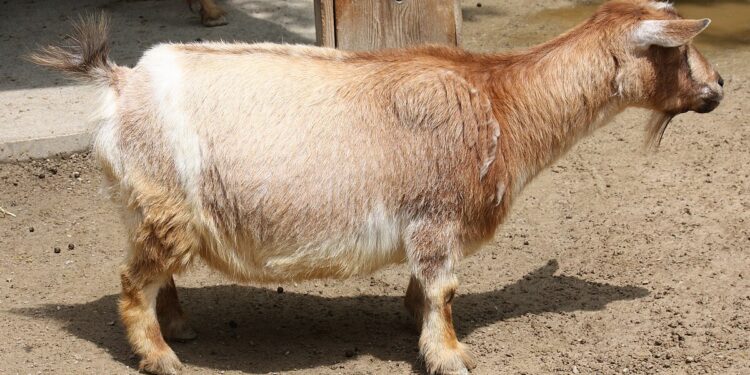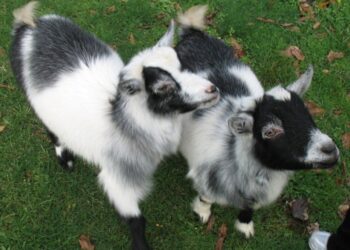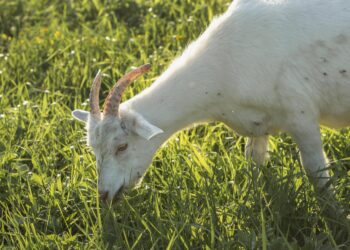Nigerian Dwarf goats are small, charming, and increasingly popular among goat enthusiasts. These miniature dairy goats are known for their friendly personalities, manageable size, and impressive milk production.
In this comprehensive guide, we’ll cover everything you need to know about Nigerian Dwarf goats, from their diet to their lifespan. We’ll also answer common questions and provide valuable tips for prospective goat owners.
What Do Nigerian Dwarf Goats Eat?
A balanced diet is essential for the health and well-being of Nigerian Dwarf goats. Their diet primarily consists of:
- Hay: High-quality hay is the staple of their diet. The best hay for Nigerian Dwarf goats includes alfalfa and Timothy hay, which provide essential nutrients.
- Grains: While not a primary food source, grains like oats and barley can be given in moderation.
- Fresh Vegetables: Vegetables such as carrots, kale, and spinach are great for adding variety to their diet.
- Fruits: Apples, bananas, and berries are enjoyed by these goats but should be given in moderation due to their sugar content.
- Mineral Supplements: Providing a mineral block ensures they get all the necessary nutrients.
How Long Do Nigerian Dwarf Goats Live?
Nigerian Dwarf goats have a relatively long lifespan for goats, typically living between 12 to 15 years with proper care.
Factors influencing their lifespan include diet, healthcare, and living conditions. Regular veterinary check-ups and a balanced diet can help maximize their lifespan.
Full-Grown Nigerian Dwarf Goats: Size and Characteristics
How Big Do Nigerian Dwarf Goats Get?
Full-grown Nigerian Dwarf goats are small compared to other goat breeds. Males, or bucks, usually stand around 23.5 inches tall, while females, or does, are slightly smaller, standing at about 22.5 inches. They typically weigh between 60 to 80 pounds.
Nigerian Dwarf Goats Size
Their small size makes Nigerian Dwarf goats an excellent choice for those with limited space. Despite their diminutive stature, they are known for their friendly and playful nature, making them a joy to have around.
Baby Nigerian Dwarf Goats: Care and Feeding
Baby Nigerian Dwarf goats, or kids, are incredibly adorable and require special care. Their diet should include:
- Colostrum: In the first 24 hours, kids need colostrum, the nutrient-rich first milk from their mother.
- Milk: After the initial colostrum, kids should be bottle-fed goat milk or a suitable milk replacer for about 8-12 weeks.
- Hay and Grain: Gradually introduce hay and grain to their diet as they grow.
How Long Are Nigerian Dwarf Goats Pregnant?
Nigerian Dwarf goats have a gestation period of approximately 145 to 155 days. During pregnancy, it’s crucial to provide the doe with a nutritious diet, ample water, and a stress-free environment to ensure a healthy delivery and offspring.
What to Feed Nigerian Dwarf Goats
Feeding Nigerian Dwarf goats requires a mix of roughage, grains, and supplements. Key elements include:
- Roughage: Hay should be the primary food source.
- Grains: A limited amount of grains can be added for extra energy.
- Supplements: Provide a mineral block and ensure access to fresh water at all times.
Are Nigerian Dwarf Goats Good for Meat?
While Nigerian Dwarf goats are primarily dairy goats, they can also be raised for meat. However, they are not as commonly used for meat production as larger breeds due to their smaller size and higher value as dairy and companion animals.
How Much Space Do Nigerian Dwarf Goats Need?
Nigerian Dwarf goats are relatively small, but they still need adequate space to roam and graze. Typically, each goat should have at least 200 square feet of outdoor space. Additionally, they require a secure shelter to protect them from the elements and predators.
What Are Nigerian Dwarf Goats Good For?
Nigerian Dwarf goats are versatile animals known for:
- Milk Production: They produce rich, high-butterfat milk ideal for making cheese, butter, and soap.
- Companionship: Their friendly and playful nature makes them excellent pets.
- Show Animals: They are often showcased in goat shows due to their attractive appearance and manageable size.
What Are the Disadvantages of Nigerian Dwarf Goats?
While Nigerian Dwarf goats have many benefits, there are some disadvantages to consider:
- High Maintenance: They require regular care, including hoof trimming, deworming, and vaccinations.
- Escape Artists: They are known for their ability to escape enclosures, necessitating secure fencing.
- Noise: They can be quite vocal, which may be an issue in certain living environments.
Are Nigerian Dwarf Goats Good Pets?
Yes, Nigerian Dwarf goats make excellent pets. They are affectionate, intelligent, and enjoy human interaction. Their small size makes them easy to handle, and they get along well with other animals, including dogs and chickens.
How Much Should I Pay for a Nigerian Dwarf Goat?
The price of Nigerian Dwarf goats varies based on factors such as pedigree, age, and purpose (dairy, pet, or show). On average, you can expect to pay between $100 to $300 for a pet-quality goat, while show-quality or high-pedigree goats can cost significantly more.
Why Are Nigerian Dwarf Goats So Expensive?
Nigerian Dwarf goats are expensive due to their desirable traits, including their friendly disposition, high milk production, and suitability as pets. Additionally, their popularity in goat shows and as companions drives up their value.
Are Nigerian Dwarf Goats High Maintenance?
Nigerian Dwarf goats do require a certain level of care, which can be considered high maintenance by some. Regular tasks include:
- Feeding and Watering: Daily feeding and ensuring constant access to fresh water.
- Hoof Trimming: Hooves need to be trimmed every 4-6 weeks.
- Health Care: Regular deworming, vaccinations, and veterinary check-ups are necessary.
- Shelter Maintenance: Keeping their living area clean and secure.
Can You Keep Nigerian Dwarf Goats with Chickens?
Yes, Nigerian Dwarf goats can be kept with chickens. They generally get along well and can share a living space if it is appropriately set up. Ensure that the goats have their own space for feeding and sleeping to prevent any conflicts or competition for food.
How Many Acres Do Nigerian Dwarf Goats Need?
While Nigerian Dwarf goats don’t need a lot of space, they do require room to graze and roam. Generally, one acre of land can comfortably support three to four Nigerian Dwarf goats. However, the actual number may vary depending on the quality of the pasture and the availability of supplementary feed.
How Many Nigerian Dwarf Goats Should I Get?
Goats are social animals and thrive in the company of others. It’s recommended to keep at least two Nigerian Dwarf goats to prevent loneliness and stress. A small herd of two to four goats is ideal for most situations.
Which Is Better: Pygmy Goat or Nigerian Dwarf?
Both Pygmy goats and Nigerian Dwarf goats have their unique advantages. Here’s a quick comparison:
- Size: Pygmy goats are generally stockier and shorter, while Nigerian Dwarf goats are more slender and slightly taller.
- Milk Production: Nigerian Dwarf goats are superior milk producers with higher butterfat content.
- Temperament: Both breeds are friendly and make great pets, but Nigerian Dwarf goats are often considered more docile and easier to handle.
How Tall Should a Fence Be for Nigerian Dwarf Goats?
Fencing for Nigerian Dwarf goats should be at least 4 feet tall to prevent escapes. They are agile and can jump or climb if the fence is too low. Use sturdy, goat-proof fencing materials to ensure their enclosure is secure.
What Kind of Shelter Do Nigerian Dwarf Goats Need?
Nigerian Dwarf goats need a well-ventilated, dry, and secure shelter to protect them from harsh weather and predators. The shelter should provide enough space for each goat to lie down comfortably and include bedding such as straw or wood shavings.
Conclusion
Nigerian Dwarf goats are a delightful addition to any small farm or homestead. They are friendly, productive, and relatively easy to care for with the right knowledge and preparation. Whether you’re interested in their milk, companionship, or simply their charming presence, these goats have a lot to offer.
To learn more about what pygmy goats eat, check out our detailed guide on Pygmy Goats Eat.
For those considering adding Nigerian Dwarf goats to their lives, we hope this guide has provided valuable insights. Keep visiting us on Pet Rescue Blog for more tips and information on caring for your beloved animals.










